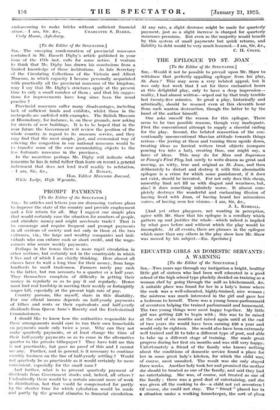THE EPILOGUE TO ST. JOAN [To the Editor of the
SPECTATOR.] SIR,—Would it not be possible to prevail upon Mr. Shaw to withdraw that perfectly appalling epilogue from .his play, St. Joan ? This may seem a very belated appeal, but it was only last week that I sat for three enchanted hours at this delightful play, only to have a deep impression reality, I had almost written—wiped out by that truly terrible last twenty-five minutes. So great a play, historically and artistically, should be rescued even at this eleventh hour from such wanton destruction, though the latter be by the hand of the author himself.
One asks oneself the reason for this epilogue. There seem to be two possible reasons, though very inadequate. First the conventional attempt to supply a cheerful ending. for the play. Second, the belated reassertion of the con-. ventionally unconventional Shavian attitude towards things serious—the jeering at them and turning them upside down, treating ideas as farcical writers treat objects (compare pouring tea into a hat), creating thus, one might say, a farce of ideas. This may do for Man and Superman or Fanny's First Play, but surely to write drama as great and moving, as witty, true and original as St. Joan, and then deliberately to distort and destroy it with this abominable epilogue is a crime for which some punishment, if it does not exist, should be invented. For not only does this cheap, unworthy final act fill us with disgust and weariness, but, alas! it does something infinitely worse. It almost com- pletely destroys the wonderful and enchanting illusion of having lived with Joan, of having heard her miraculous voices, of having seen her visions.—I am, Sir, &c., J. L. KIMBALL.
[And yet other playgoers, not wanting in perception, agree with Mr. Shaw that his epilogue is a corollary which gathers up and justifies the whole—which indeed is implied by what goes before and without which the play would be incomplete. At all events, there are phrases in the epilogue which more than any others in the play show how Mr. Shaw was moved by his subject.—En. Spectator.]














































 Previous page
Previous page